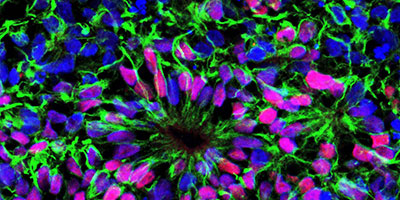Neurobiology
 Faculty in the Division of Neurobiology (NEU) engage in advanced research in neuroscience from the molecular to the integrative and computational levels. Specific topics under investigation include: molecular and biophysical analysis of ion channels; receptors and signal transduction mechanisms; formation and plasticity of synapses; control of neural cell fate and pattern formation; neuronal growth-cone guidance, target recognition and regeneration; mechanisms of sensory processing in the visual, auditory, olfactory and gustatory systems; and development and function of neural networks. The preparations being investigated range from cells in culture, to simple invertebrate systems and model genetic organisms, to the mammalian cerebral cortex. The faculty offer an integrated approach to training in modern neurobiology, spanning the use of molecular and classical genetics; molecular, biochemical, cell biological and anatomical methods; electrophysiological and biophysical techniques; functional genomics; advanced optical imaging; and computational analysis. Members of the Division (as well as faculty from the Divisions of Cell & Developmental Biology and Genetics & Development) also participate in the campus-wide Neuroscience Graduate Program, which is administered by the Helen Wills Neuroscience Institute and includes faculty from the Departments of Psychology, Integrative Biology, Physics (College of Letters and Science), Vision Science (School of Optometry), Environmental Science, Policy and Management (College of Natural Resources), and Chemical Engineering (College of Chemistry). While the MCB Program welcomes students interested in all areas of neuroscience, students focused primarily on systems-level and cognitive neuroscience are also encouraged to consider applying to the Neuroscience Graduate Program. The Division sponsors a weekly seminar series by invited speakers, and together with the Helen Wills Neuroscience Institute co-sponsors the annual campus-wide Neuroscience retreat.
Faculty in the Division of Neurobiology (NEU) engage in advanced research in neuroscience from the molecular to the integrative and computational levels. Specific topics under investigation include: molecular and biophysical analysis of ion channels; receptors and signal transduction mechanisms; formation and plasticity of synapses; control of neural cell fate and pattern formation; neuronal growth-cone guidance, target recognition and regeneration; mechanisms of sensory processing in the visual, auditory, olfactory and gustatory systems; and development and function of neural networks. The preparations being investigated range from cells in culture, to simple invertebrate systems and model genetic organisms, to the mammalian cerebral cortex. The faculty offer an integrated approach to training in modern neurobiology, spanning the use of molecular and classical genetics; molecular, biochemical, cell biological and anatomical methods; electrophysiological and biophysical techniques; functional genomics; advanced optical imaging; and computational analysis. Members of the Division (as well as faculty from the Divisions of Cell & Developmental Biology and Genetics & Development) also participate in the campus-wide Neuroscience Graduate Program, which is administered by the Helen Wills Neuroscience Institute and includes faculty from the Departments of Psychology, Integrative Biology, Physics (College of Letters and Science), Vision Science (School of Optometry), Environmental Science, Policy and Management (College of Natural Resources), and Chemical Engineering (College of Chemistry). While the MCB Program welcomes students interested in all areas of neuroscience, students focused primarily on systems-level and cognitive neuroscience are also encouraged to consider applying to the Neuroscience Graduate Program. The Division sponsors a weekly seminar series by invited speakers, and together with the Helen Wills Neuroscience Institute co-sponsors the annual campus-wide Neuroscience retreat.
Faculty
The following is an alphabetical list of active MCB faculty members in the division and brief descriptions of their research. Additional faculty lists are available using the following links:
Emeriti and Professors of the Graduate School | Secondary Divisional Affiliates
[Return to Top]
Emeriti and Professors of the Graduate School
John Ngai
Professor Emeritus of Neurobiology
Molecular and cellular mechanisms of olfaction
W. Geoffrey Owen
Professor Emeritus of Neurobiology
Membrane biophysics; retinal neurophysiology
Frank Werblin
Professor Emeritus of Neurobiology
Neurophysiology of vision
Gerald Westheimer
Professor of the Graduate School Division of Neurobiology
Neurobiology; psychophysics
Secondary Divisional Affiliates
The following faculty have a secondary affiliation with the Neurobiology division.
Beth Burnside
Professor Emerita of Cell Biology, Development and Physiology
Cell biology of the photoreceptor cytoskeleton
Andrew Dillin
Howard Hughes Medical Institute Investigator and Thomas and Stacey Siebel Distinguished Chair in Stem Cell Biology and Professor of Immunology and Molecular Medicine
My laboratory works on the genetic and molecular mechanisms that regulate aging and aging-related disease.
Gian Garriga
Professor Emeritus of Genetics, Genomics, Evolution, and Development
Developmental neurobiology; molecular genetics
Kristin Scott
Professor Emeritus of Genetics, Genomics, Evolution, and Development
Processing gustatory information in the Drosophila brain
David Weisblat
Professor of the Graduate School Division of Cell Biology, Development and Physiology
Developmental biology